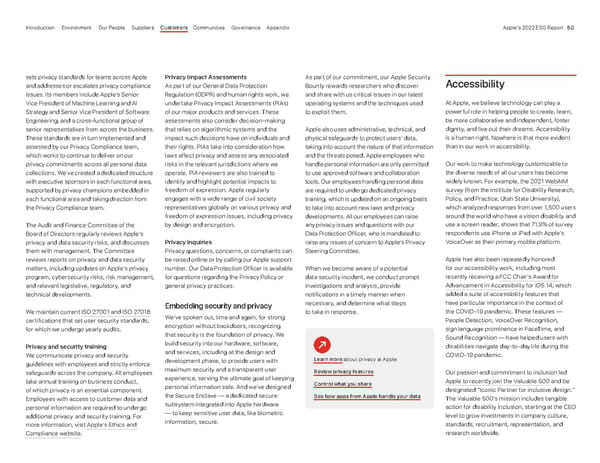sets privacy standards for teams across Apple and addresses or escalates privacy compliance issues. Its members include Apple’s Senior Vice President of Machine Learning and AI Strategy and Senior Vice President of Software Engineering, and a cross-functional group of senior representatives from across the business. These standards are in turn implemented and assessed by our Privacy Compliance team, which works to continue to deliver on our privacy commitments across all personal data collections. We’ve created a dedicated structure with executive sponsors in each functional area, supported by privacy champions embedded in each functional area and taking direction from the Privacy Compliance team. The Audit and Finance Committee of the Board of Directors regularly reviews Apple’s privacy and data security risks, and discusses them with management. The Committee reviews reports on privacy and data security matters, including updates on Apple’s privacy program, cybersecurity risks, risk management, and relevant legislative, regulatory, and technical developments. We maintain current ISO 27001 and ISO 27018 certifications that set user security standards, for which we undergo yearly audits. Privacy and security training We communicate privacy and security guidelines with employees and strictly enforce safeguards across the company. All employees take annual training on business conduct, of which privacy is an essential component. Employees with access to customer data and personal information are required to undergo additional privacy and security training. For more information, visit Apple’s Ethics and Compliance website . Privacy Impact Assessments As part of our General Data Protection Regulation (GDPR) and human rights work, we undertake Privacy Impact Assessments (PIAs) of our major products and services. These assessments also consider decision-making that relies on algorithmic systems and the impact such decisions have on individuals and their rights. PIAs take into consideration how laws affect privacy and assess any associated risks in the relevant jurisdictions where we operate. PIA reviewers are also trained to identify and highlight potential impacts to freedom of expression. Apple regularly engages with a wide range of civil society representatives globally on various privacy and freedom of expression issues, including privacy by design and encryption. Privacy inquiries Privacy questions, concerns, or complaints can be raised online or by calling our Apple support number. Our Data Protection Officer is available for questions regarding the Privacy Policy or general privacy practices. Embedding security and privacy We’ve spoken out, time and again, for strong encryption without backdoors, recognizing that security is the foundation of privacy. We build security into our hardware, software, and services, including at the design and development phase, to provide users with maximum security and a transparent user experience, serving the ultimate goal of keeping personal information safe. And we’ve designed the Secure Enclave — a dedicated secure subsystem integrated into Apple hardware — to keep sensitive user data, like biometric information, secure. As part of our commitment, our Apple Security Bounty rewards researchers who discover and share with us critical issues in our latest operating systems and the techniques used to exploit them. Apple also uses administrative, technical, and physical safeguards to protect users’ data, taking into account the nature of that information and the threats posed. Apple employees who handle personal information are only permitted to use approved software and collaboration tools. Our employees handling personal data are required to undergo dedicated privacy training, which is updated on an ongoing basis to take into account new laws and privacy developments. All our employees can raise any privacy issues and questions with our Data Protection Officer, who is mandated to raise any issues of concern to Apple’s Privacy Steering Committee. When we become aware of a potential data security incident, we conduct prompt investigations and analysis, provide notifications in a timely manner when necessary, and determine what steps to take in response. Learn more about privacy at Apple Review privacy features Control what you share See how apps from Apple handle your data Accessibility At Apple, we believe technology can play a powerful role in helping people to create, learn, be more collaborative and independent, foster dignity, and live out their dreams. Accessibility is a human right. Nowhere is that more evident than in our work in accessibility. Our work to make technology customizable to the diverse needs of all our users has become widely known. For example, the 2021 WebAIM survey (from the Institute for Disability Research, Policy, and Practice, Utah State University), which analyzed responses from over 1,500 users around the world who have a vision disability and use a screen reader, shows that 71.9% of survey respondents use iPhone or iPad with Apple’s VoiceOver as their primary mobile platform. Apple has also been repeatedly honored for our accessibility work, including most recently receiving a FCC Chair’s Award for Advancement in Accessibility for iOS 14, which added a suite of accessibility features that have particular importance in the context of the COVID-19 pandemic. These features — People Detection, VoiceOver Recognition, sign language prominence in FaceTime, and Sound Recognition — have helped users with disabilities navigate day-to-day life during the COVID-19 pandemic. Our passion and commitment to inclusion led Apple to recently join the Valuable 500 and be designated “Iconic Partner for inclusive design.” The Valuable 500’s mission includes tangible action for disability inclusion, starting at the CEO level to grow investments in company culture, standards, recruitment, representation, and research worldwide. Appendix Governance Communities Suppliers Customers Our People Environment Introduction Apple’s 2022 ESG Report 50
 ESG Report | Apple Page 49 Page 51
ESG Report | Apple Page 49 Page 51